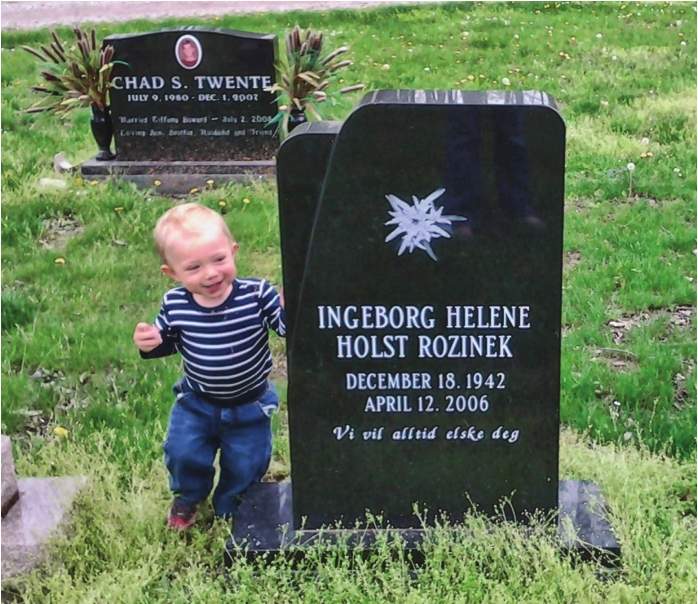Erika Holst was 26 when she lost her mother to ovarian cancer. Six years later, she became a mother herself.
My mother’s pet name for me was lillegull, a Norwegian term of endearment that translates to “little golden child.” I was her only child, born when she was 36, and she loved me madly. Spise opp! She would say, pulling me close and hugging me tightly. I want to eat you up!
Her death from ovarian cancer neatly marked the dividing line between my youth and adulthood. At 26, married, with a house and job, I was nominally an adult already, but in reality I was still drifting rather mindlessly through something of a prolonged adolescence at that point. Life had not been really real for me yet, real in the way that a teary phone call home to mom and dad couldn’t fix, real in the way it gets when you’re handed a crushing blow and you must either learn to survive it or be lost.
The terrible final weeks of her illness left me nearly broken, emotionally and physically. Her funeral was the blackest day of my life. “Does it get much worse than this?” I asked a family friend who had lost her parents young. “No, this is the worst part,” she assured me. “But you’ll miss her when your babies are born.”
It would be another six years before I would learn what she meant. In the course of those six years my life had imploded. It was as though my mother was the linchpin that held together life as I knew it; without her, it all fell apart. I got divorced, lost my job, had to sell my house, lost my father. Yet, in the crucible of my grief, a new life was formed: I got another, better job, remarried, bought a new house. One May afternoon I found myself standing in front of my parents’ graves. The sun was shining brightly, a breeze was making the trees dance, and at that moment I felt nothing but joy and the promise of life. Days later I learned I was expecting my son.
That family friend had been right; after six years of making peace with her death, I grieved for my mother all over again when my baby was born. I grieved for little things, like my inability to pick up the phone and ask her what her pregnancy had been like, how many hours she’d been in labor, how I’d slept as a newborn, what to do with a fussy baby; and I grieved for the cold reality of a life where my mother would never know my precious son.
She would have been a wonderful grandmother, or mormor (mother’s mother) as she would have been called. When her nieces in Norway had their babies, my mother regularly sent gifts, kept up with their milestones by letter and by phone, and snuggled them on regular visits. She would have been over the moon about my little blond Viking, whom I named Anders as a nod to her Scandinavian heritage. I still indulge in daydreams about what it would be like if my parents hadn’t died, if they could have called and visited and been a part of my new life.
Yet, in a strange way, I now understand my mother better than I ever did when she was alive. With my son’s birth, it seems like I didn’t just become a mother, I became my mother. As I cover my son’s fluffy blond head in kisses, I understand why my mother wanted to spise opp. As I watch him grow more independent, I understand the worry she constantly felt for my happiness and safety. As I give in to my son’s requests for an extra piece of chocolate, I understand why my mother indulged me. Even the shape of my body, altered (fine, enlarged) by pregnancy and childbirth, is exactly like my mother’s when she was my age. What I lost in terms of my mother’s physical presence in my life, I gained in terms of insight into who she was and what made her tick.
The biggest impact my mother’s death had on my own experience as a parent, however, is my determination to fully appreciate every moment I have with my son. I tell him I love him a dozen times a day; I kiss him and snuggle him as often as he’ll let me; I savor the feel of his little hand in mine. The poet Mary Oliver asks “doesn’t everything die at last, and too soon?” Yes, I know firsthand that it does; no matter how long you have with someone, when you come to the end of the road, it always feels too soon. “Tell me,” Oliver continues, “what is it you plan to do with your one wild and precious life?” I plan to love my son like crazy and enjoy every single moment we have, just like my mother did with me.
Erika Holst of Springfield, a member of the Springfield Art Association staff, is a frequent contributor to Capital City Parent.
